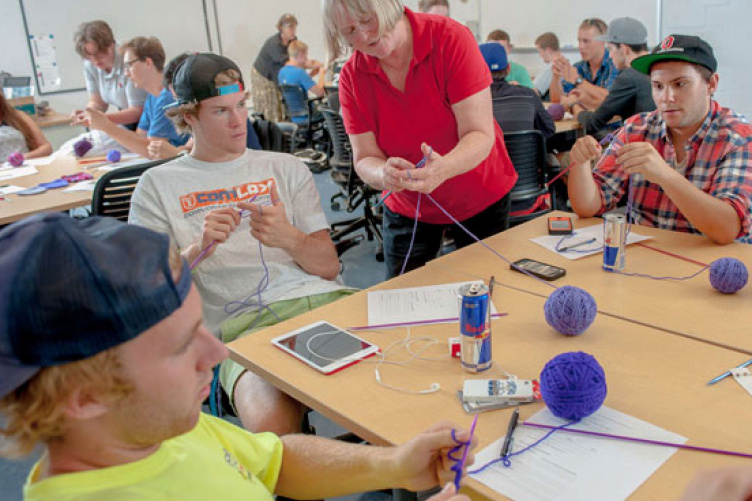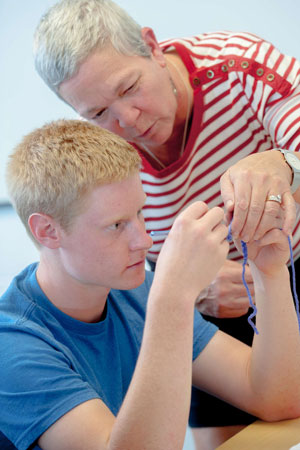
In the UNH Thompson School of Applied Science Human Relations 201 class, Mary DeTurk teaches students to knit baby caps. The students have partnered with the New Hampshire Children’s Trust to raise awareness of shaken baby syndrome.
Students in a general social science course at the University of New Hampshire’s Thompson School of Applied Science have aligned with the New Hampshire Children’s Trust to help prevent shaken-baby syndrome – and they’ve taken up hooks and needles to do so. Participating in the Trust’s CLICK for Babies campaign to educate new parents about normal infant crying, 27 first-year students in Human Relations 201 are learning to knit and crochet baby caps.
“I’ve really become committed to using community engagement as a way of teaching,” says Thompson School professor Kate Hanson. “We work better when what we’re doing is real. We’ve publicly committed to New Hampshire Children’s Trust, so this brings a reality to our work.”
The project, says Hanson, helps students identify the elements of positive, effective relationships and work on factors that contribute to those relationships, like group processes, organizational structures, social and political norms, values, and laws. “There are a lot of ways we can connect this to what they’re learning,” she says.
|
Jeff Taylor, a student in the UNH Thompson School of Applied Science Human Relations 201 class, learns to crochet from Pam Kayden-Babish of UNH Health Services. |
But first, the students need to learn to knit or crochet; they committed to producing two caps each by Oct. 1. No one in the class of 20 men and 7 women had any prior experience, so Hanson recruited five UNH staff members to teach the needle crafts during two classes.
At their first session, the students, faces taut with concentration, worked to master the cast on, base row, single crochet and knit stitch that will form the foundation of the tiny purple caps they’ll produce. Each stitch represented a monumental effort: “Boom!” exclaimed Mike McLaughlin of Tewksbury, Mass., upon successful completion of his first row of stitches.
Others were less triumphant. “I can play four varsity sports, but crocheting is just not happening now,” said Jeff Taylor of Plainfield.
Crochet coach Pam Kayden-Babish, a health educator at UNH Health Services, encouraged Taylor and his classmates: “Don’t say you can’t! It’s not wrong, it’s just loose.”
A GoPro camera, more commonly used to document extreme sports, sat on the table aimed at the students’ tense hands. Part of their class project, says Hanson, involves documenting their efforts through video, photos, PowerPoint and Instagram to share their experiences.
Even as the students struggled to tame their skeins of purple yarn, they were upbeat about their task. “I never really aspired to learn to make hats, but it’s a cool experience,” said McLaughlin. “I might even make a few extra.”
In addition to Kayden-Babish, volunteer instructors are Mary DeTurk, Celebrity Series manager; Rachel Gogan, library services assistant in the Biological Sciences Library; Tanya Hakala, Web specialist in the College of Life Sciences and Agriculture; and Barbara Steinberg, a recently retired UNH employee.
The N.H. Children’s Trust is coordinating the state’s participation in the national CLICK for Babies: Period of PURPLE Crying Caps campaign of the National Center on Shaken Baby Syndrome, which is harnessing the needles of knitters and crocheters to make purple baby caps to be delivered to new parents in November and December, along with educational information. PURPLE is an acronym that describes the characteristics of a developmental stage of increased crying, which can trigger parent or caregiver frustration.
The Thompson School of Applied Science was founded in 1895 to provide a broader opportunity to the citizens of the state to study the agricultural sciences in a two-year timeframe instead of four years. The Thompson School, an academic unit of the College of Life Sciences and Agriculture, upholds this legacy by providing high-quality associate degree programs with an educational belief that the best way to learn is by doing.
-
Written By:
Staff writer | Communications and Public Affairs




















































